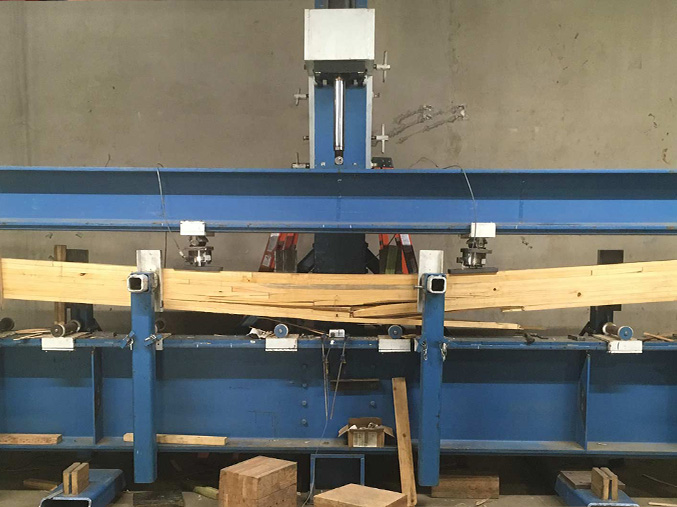ISO 3134 Shear Modulus Testing of Wood
The shear modulus is a fundamental mechanical property that quantifies a material's resistance to shearing stress. In the context of wood and timber, this measurement provides critical insights into the structural integrity and performance under loading conditions. This service aligns with ISO 3134, which specifies procedures for determining the in-plane shear modulus by means of the four-point bending test.
Understanding the shear modulus is crucial for architects, engineers, and material scientists working on building & infrastructure projects involving wood products. It helps them assess how a timber product will behave under stress and informs decisions about its suitability for specific applications. For instance, in the construction industry, accurate knowledge of shear modulus can prevent structural failures due to unexpected deformations.
The testing process involves subjecting a standard specimen cut from the wood sample to controlled loading conditions using specialized equipment that measures displacement at various points along the length of the specimen. This allows for precise calculation of the shear strain and subsequently the shear modulus.
Accurate determination of the shear modulus is essential not only for ensuring compliance with international standards but also for optimizing product design and enhancing overall performance. By providing reliable data on this critical property, our service supports informed decision-making processes across various sectors including construction, furniture manufacturing, and sustainable development initiatives.
Our state-of-the-art facilities use cutting-edge technology to ensure consistent and accurate results. Each test follows strict protocols outlined in ISO 3134, ensuring that every measurement is reliable and repeatable. We employ experienced technicians who are trained specifically for this type of testing, guaranteeing high-quality outcomes.
The importance of shear modulus cannot be overstated when it comes to selecting appropriate materials for demanding applications such as bridges or tall buildings where even minor discrepancies could lead to catastrophic failures. Our comprehensive service offers more than just compliance – it provides valuable insights that can significantly impact the longevity and safety of structures made from wood products.
Compliance with international standards like ISO 3134 ensures that all testing processes adhere to industry best practices, providing confidence in the integrity of results. This is particularly important for organizations seeking certification or approval under regulatory frameworks governing construction materials.
Frequently Asked Questions
Why It Matters
The shear modulus testing service is vital because it provides essential information about the mechanical behavior of wood under shearing stress. This data is indispensable for designing and constructing safe, durable structures that can withstand environmental conditions and loads over extended periods. By accurately measuring shear modulus, engineers and architects gain valuable insights into the performance characteristics of different types of timber.
For instance, understanding the shear modulus allows us to predict how a particular species of wood will behave under varying degrees of stress during use in construction projects or furniture manufacturing processes. This knowledge is crucial for selecting appropriate materials that meet both functional requirements and safety standards.
The results from ISO 3134 Shear Modulus Testing can influence decisions regarding the choice of timber products, influencing everything from structural design to sustainability practices. It also contributes towards ensuring compliance with relevant international standards, thereby enhancing overall product quality and reliability.
Industry Applications
| Application Area | Description |
|---|---|
| Bridges & High-Rise Structures | Evaluating the stability and longevity of large-scale constructions made from wood. |
| Furniture Manufacturing | Ensuring that the materials used in making furniture meet specified strength requirements. |
| Sustainable Building Practices | Determining the optimal use of renewable resources by assessing their structural properties. |
The shear modulus testing service is particularly relevant in these areas as it provides critical data needed to ensure that wood products are fit for purpose. The information derived from this test can help engineers and designers make informed choices about material selection, optimizing both performance and sustainability.
- Bridges: Evaluating the overall structural integrity of large-scale constructions made from wood.
- Furniture Manufacturing: Ensuring compliance with industry standards related to material strength and durability.
- Sustainable Building Practices: Supporting efforts aimed at reducing environmental impact by selecting appropriate timber species based on their mechanical properties.
Quality and Reliability Assurance
The shear modulus testing service plays a pivotal role in ensuring that wood products meet stringent quality control standards. By accurately measuring the shear modulus, we can verify whether the material conforms to specified limits set by international standards like ISO 3134.
This process not only guarantees consistency within batches but also enhances confidence among end-users regarding the reliability of these materials. Regular monitoring through periodic retesting ensures long-term performance stability and helps identify any potential issues early on, facilitating timely corrective actions if necessary.
- Consistency: Ensuring that every batch produced meets predefined quality criteria.
- Reliability: Providing consistent and accurate measurements across multiple tests to build trust among stakeholders.
The shear modulus testing service thus contributes significantly towards maintaining high standards of quality assurance in the wood manufacturing sector. It supports continuous improvement initiatives by offering actionable insights that can lead to enhanced product performance and increased customer satisfaction.





